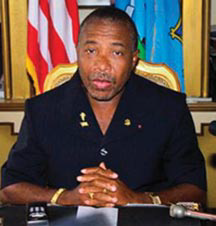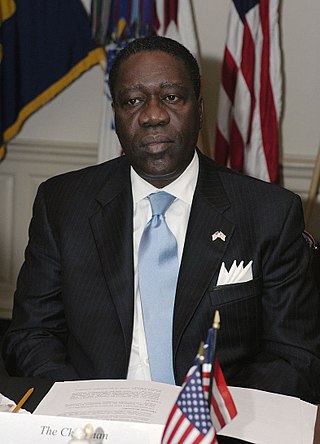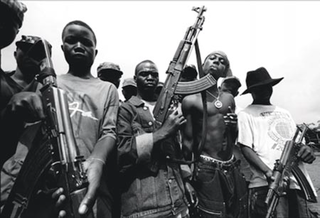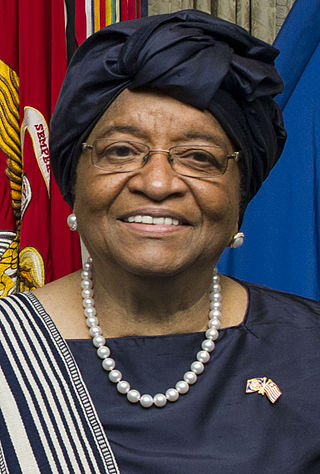Related Research Articles

Liberia is a country in West Africa founded by free people of color from the United States. The emigration of African Americans, both freeborn and recently emancipated, was funded and organized by the American Colonization Society (ACS). The mortality rate of these settlers was the highest among settlements reported with modern recordkeeping. Of the 4,571 emigrants who arrived in Liberia between 1820 and 1843, only 1,819 survived (39.8%).

The Politics of Liberia takes place in a framework of a presidential representative democratic republic modeled on the government of the United States, whereby the President is the head of state and head of government; unlike the United States, however, Liberia is a unitary state as opposed to a federation and has a pluriform multi-party system rather than the two-party system that characterizes US politics. Executive power is exercised by the government. Legislative power is vested in both the government and the two chambers of the legislature.

Charles McArthur Ghankay Taylor is a Liberian former politician and convicted war criminal who served as the 22nd president of Liberia from 2 August 1997 until his resignation on 11 August 2003 as a result of the Second Liberian Civil War and growing international pressure.
Prince Yormie Johnson is a Liberian politician who has served as a senator for Nimba County since 2006. A former rebel leader, Johnson played a prominent role in the First Liberian Civil War.

Charles Gyude Bryant was a Liberian politician and businessman. He served as the Chairman of the Transitional Government of Liberia from 14 October 2003 to 16 January 2006. The installation of the transitional government was part of the peace agreement to end the country's second civil war, which had raged since the Liberians United for Reconciliation and Democracy (LURD) rebelled against President Charles Taylor in 1999. Bryant was previously a businessman and was chosen as chairman because he was seen as politically neutral and therefore acceptable to each of the warring factions, which included LURD, the Movement for Democracy in Liberia (MODEL), and loyalists of former President Taylor. He was a prominent member of the Episcopal Church of Liberia, and was critical of the governments of Samuel Doe (1980–90) and Taylor (1997–2003).
The Movement for Democracy in Liberia (MODEL) was a rebel group in Liberia that became active in March 2003, launching attacks from Ivory Coast. MODEL was based on the Force Spéciale pour la Libération du Monde Africain (LIMA) militia formed in September 2002 to defend Laurent Gbagbo's government against insurgents backed by Liberia's president Charles Taylor. After fighting off the imminent threat, parts of LIMA crossed the border to Liberia to continue the war there. With Taylor's forces already pressed against the larger Liberians United for Reconciliation and Democracy (LURD), MODEL quickly gained ground. The initial leadership of MODEL came from LURD, while the majority of MODEL fighters were mobilized from Ivorian and Ghanaian refugee camps, to which many Liberians from the country's Southeast had fled.

The First Liberian Civil War was the first in a series of two civil wars within the West African nation of Liberia. It lasted from 1989 to 1997. President Samuel Doe established a regime in 1980 but totalitarianism and corruption led to unpopularity and the withdrawal of the support of the United States by the late 1980s. The National Patriotic Front of Liberia (NPFL) led by Charles Taylor invaded Liberia from the Ivory Coast to overthrow Doe in December 1989 and gained control over most of the country within a year. Doe was captured and executed by the Independent National Patriotic Front of Liberia (INPFL), a splinter faction of the NPFL led by Prince Johnson, in September 1990. The NPFL and INPFL fought each other for control of the capital city, Monrovia and against the Armed Forces of Liberia and pro-Doe United Liberation Movement of Liberia for Democracy. Peace negotiations and foreign involvement led to a ceasefire in 1995 but fighting continued until a peace agreement between the main factions occurred in August 1996. Taylor was elected President of Liberia following the 1997 Liberian general election and entered office in August of the same year.

The Second Liberian Civil War was a civil war in the West African nation of Liberia that lasted from 1999 to 2003.
Amos Claudius Sawyer was a Liberian politician and academic who served as interim president of Liberia from 22 November 1990 to 7 March 1994. He was voted into office by 35 leaders representing seven political parties and eleven interest groups.

General elections were held in Liberia on 19 July 1997 as part of the 1996 peace agreement ending the First Liberian Civil War. The presidency, as well as all seats in the House of Representatives and the Senate were up for election. Voter turnout was around 89%. Former rebel leader Charles Taylor and his National Patriotic Party (NPP) won the election with 75.3% of the vote, giving it about three-quarters of the legislative seats according to the proportional representation system. Taylor was inaugurated as president on 2 August 1997.
The National Patriotic Front of Liberia (NPFL) was a Liberian rebel group that initiated and participated in the First Liberian Civil War from 24 December 1989 – 2 August 1997. The NPFL emerged out of rising ethnic tensions and civil unrest due to the Liberian government that was characterized by totalitarianism, corruption, and favoritism towards ethnic Krahns. The NPFL invaded Liberia through Ivory Coast’s border with Nimba County in Liberia under the direction of Charles Taylor, a former Liberian politician and guerrilla leader who served as the 22nd president of Liberia from 2 August 1997 until his resignation on 11 August 2003.
Sekou Damate Conneh, Jr. is a Liberian politician and former rebel leader.

Ellen Johnson Sirleaf is a Liberian politician who served as the 24th president of Liberia from 2006 to 2018. Sirleaf was the first elected female head of state in Africa.
The siege of Monrovia or Fourth Battle of Monrovia, which occurred in Monrovia, Liberia between July 18 and August 14, 2003, was a major military confrontation between the Armed Forces of Liberia and Liberians United for Reconciliation and Democracy (LURD) rebels during the Second Liberian Civil War. The shelling of the city resulted in the deaths of around 1,000 civilians.
The Hon. Lewis G. Brown II is former Minister for Information, Cultural Affairs and Tourism in Liberia. After serving as minister of Information Cultural Affairs and Tourism, Lewis Garseedah Brown II was appointed by President Sirleaf as Liberia's permanent Ambassador at The United Nations and Liberia's Ambassador Extraordinary and Plenipotentiary at the Republic of Cuba in 2016. He's also the chairman of all ECOWAS's Ambassadors at UN. Amb. Brown also served as National Security Advisor to Charles Taylor and also Managing Director of LPRC.
Henry Boimah Fahnbulleh, Jr. is a Liberian politician and diplomat. He most recently served in the Liberian Government as National Security Advisor in the Ellen Johnson Sirleaf administration. Immediately previous to his appointment as National Security Advisor, he served as Advisor on International Affairs in the same government. He served as Foreign Minister from 1981 to 1983 under President Samuel Doe.
A new civil war began in 1999 when a rebel group backed by the government of neighboring Guinea, the Liberians United for Reconciliation and Democracy (LURD), emerged in northern Liberia. By the spring of 2001, they were posing a major threat to the Taylor government. Liberia was now engaged in a complex three-way conflict with Sierra Leone and the Guinea Republic. By the beginning of 2002, both of these countries were supporting the latest addition to the lexicon of Liberian guerrilla outfits – Liberians United for Reconciliation and Democracy (LURD), while Taylor was supporting various opposition factions in both countries. By supporting Sierra Leonean rebels, Taylor also drew the enmity of the British and Americans.

Women of Liberia Mass Action for Peace is a peace movement started in 2003 by women in Monrovia, Liberia, Africa, that worked to end the Second Liberian Civil War. Organized by Crystal Roh Gawding and social workers Leymah Gbowee and Comfort Freeman, the movement began despite Liberia having extremely limited civil rights. Thousands of Muslim and Christian women from various classes mobilized their efforts, staged silent nonviolence protests that included a sex strike and the threat of a curse.
The Iron Ladies of Liberia (2007) is an independently produced documentary film that gives behind-the-scenes access to President Ellen Johnson Sirleaf's first year in government. Johnson-Sirleaf is Africa's first female president.

Jucontee Thomas Woewiyu, also known as Tom Woewiyu or Thomas Smith, was the former leader of the National Patriotic Front of Liberia (NPFL), with Charles Taylor.
References
- ↑ "LIBERIA: Warring Parties Agree to Disarm, Rebels Nominate Ministers | Liberia | Governance." IRIN • Humanitarian News and Analysis from Africa, Asia and the Middle East - Updated Daily. UN Office for the Coordination of Humanitarian Affairs, 15 Oct. 2003. Web. 28 Oct. 2010. <http://www.irinnews.org/report.aspx?reportid=46720>.
- ↑ Cobb, Charles. "AllAfrica.com: Liberia: Rebel Disarmament 'Irreversible' Says Liberia Foreign Minister." AllAfrica.com: Home. All Africa.com, 6 Feb. 2004. Web. 28 Oct. 2010. <http://allafrica.com/stories/200402060001.html>.
